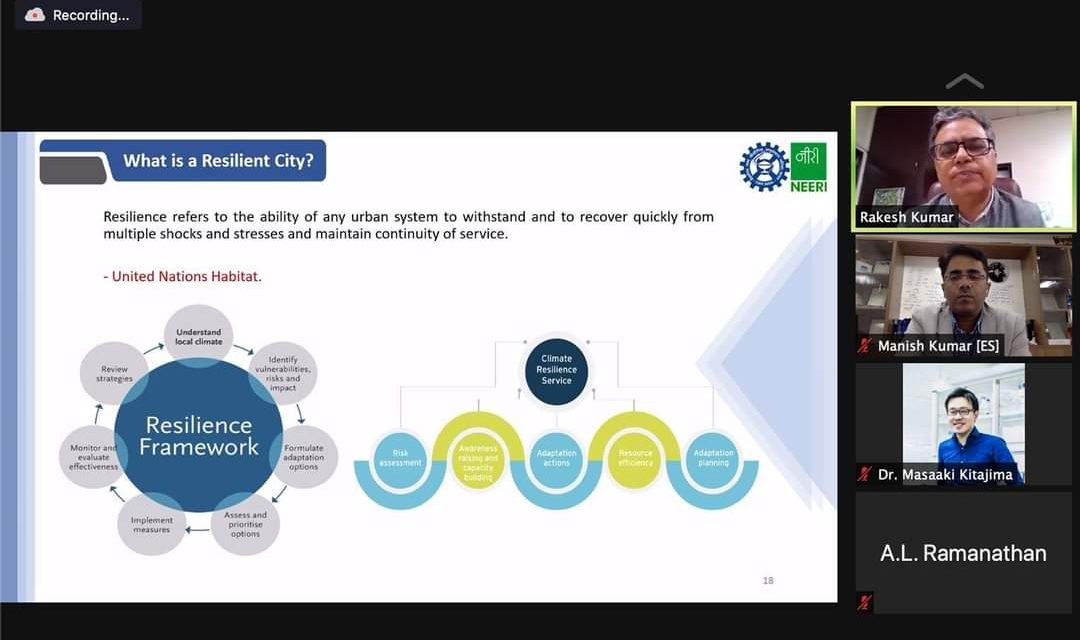The three-day “Indo-UK Virtual Conference on the 5C’s of Water Vulnerability: Climate Change, Contaminants, Co-occurrence, Conflicts, and COVID-19”, hosted by IITGN commenced yesterday evening with more than 200 participants from India and abroad.
Dr Rakesh Kumar, Director, Council of Scientific and Industrial Research – National Environmental Engineering Research Institute (CSIR-NEERI), delivered the inaugural talk on “Climate Linked Resilient Cities Developmental Planning”. Discussing environmental management strategies for healthy and sustainable cities, Dr Rakesh Kumar stressed upon a broader territorial perspective to help cities attain economies of scale; resources accounting and its management; making Urban Local Bodies (ULBs) self-reliant; strategic mitigating measures for climate change; and efficient urban mobility and public transport. “A planned city is a well-prepared city for sustainable development”, he said.
Talking about key challenges and opportunities in the way of building resilient cities, he said, “Traffic jams and vehicular pollution, poor urban infrastructure, urban heat island effect, housing for all, lack of healthcare facilities, air pollution, heat waves in summer, urban flash floods in monsoon due to poor drainage infrastructure, sanitation and hygiene at public places, selection of a suitable site for disposal of the huge amount of solid waste and reducing the chances of fire hazards at dump yards; health hazard for rag pickers are some of the challenges faced by the cities today. We should tackle these challenges with efficient and sustainable solutions like intelligent transportation system; using mass rapid transit system and car-pooling, work from home wherever possible, to reduce the need of vehicles; promoting circular/green economy; green buildings; use of renewables; developing new sewage system and improving existing sewerage infrastructure as per requirements; promoting reduce, reuse, recycle to decrease the waste going to landfill sites; and use of IoT (Internet of Things) for smart controls.”
Dr Kumar also informed that India has the largest number of green buildings. He also shared how cities across the USA and Canada have begun planning to improve resilience for climate change and shared the resilience strategy of Pittsburgh. Dr Rakesh Kumar then shared adaptation strategies of the United Nations and Australia. He also talked about initiatives taken in India, including the Climate Resilient City Action Plans (CRCAP) for four cities, namely Udaipur, Siliguri, Coimbatore, and Rajkot.
Wide variations in the results of climate models is one of the causes of resistance towards investment in climate action, both mitigation and adaptation. We need to start looking at other climate models so that our climate change mitigation measures are focused. Cities can build more resilient neighbourhoods by tailoring early warning systems to meet the needs of vulnerable people; mapping city services and accessing amenities; building long-term resilience into infrastructure and planning; and promoting an inclusive culture.
Rakesh KumarIn his concluding remarks, Dr Rakesh Kumar said, “It is an urgent need that climate resiliency is built-in the planning and development of society. Modern tools and techniques such as Computational Fluid Dynamics (CFD) and Weather Research and Forecasting (WRF) can be used to mitigate the impacts of climate change at micro and meso scale. Knowledge can be derived from ancient architecture as well to reduce carbon footprints and build resilient structures. We must also look at nature again to formulate developmental and mitigation plans.”
After the inaugural talk, experts from India, Japan, USA, and UK deliberated on three themes for the day-1 of the conference. Dr Aaron Bivins, University of Notre Dame, USA; Dr Masaki Kitajima, Hokkaido University, Japan; Dr Ryo Honda, Kanazawa University, Japan; and Dr Shannon Bartelt-Hunt, University of Nebraska-Lincoln, USA, deliberated on the theme of “COVID-19 and the participation of water scientists”. After that, Dr David Werner, Newcastle University, UK; Dr Manish Kumar, IIT Gandhinagar; and Dr Tanushree Bhattacharya, BIT Mesra, discussed “Environmental Engineering Solutions”. Lastly, Dr Abhijit Mukherjee, IIT Kharagpur; Dr Dipankar Saha, Central Ground Water Board; Dr Manish Kumar, IIT Gandhinagar; and Dr Prosun Bhattacharya, KTH Royal Institute of Technology, talked about “Geogenic Concerns of Water”.
Over the three days of the conference, leading academicians, scientists, researchers, and practitioners from India and abroad will share their experiences, recent innovations, trends, concerns, practical challenges, and solutions on ten different themes affecting the water, including “Contaminant Transport and Remediation”; “Microbiological Water Quality”; “Public Health and Conflicts”; “Quantity and Quality: Two Sides of the Same Climate Change Coin”; “Vulnerability to Resilience and Role of Rapid Testing”; “River Health and Geomorphology”; and “Contaminants of Emerging Concern”. Dr V M Tiwari, Director, Council Of Scientific And Industrial Research–National Geophysical Research Institute (CSIR-NGRI), will lead the concluding session of the Indo-UK Virtual Conference on December 16, 2020.
The conference is co-organised by IITGN’s discipline of Earth Sciences, Dr Kiran C Patel Centre for Sustainable Development (KPCSD), the UK-India Education Research Initiative (UKIERI), Newcastle University, British Council, and the Department of Science and Technology, Government of India. Dr Manish Kumar, Earth Sciences, IITGN, and Dr David Werner, School of Engineering, Newcastle University, UK, are conveners of the workshop.

